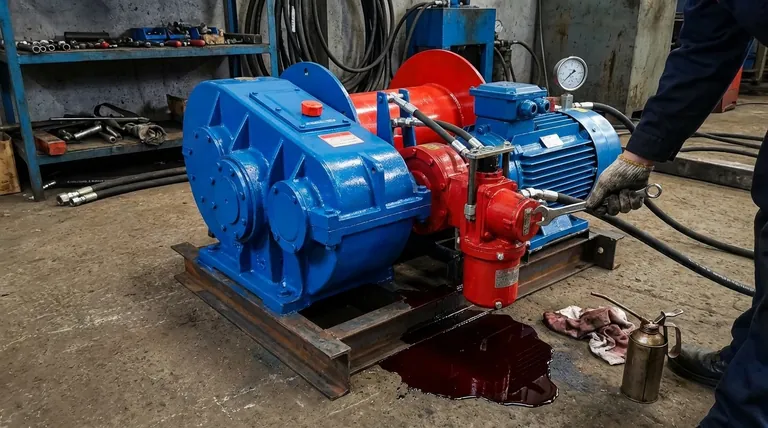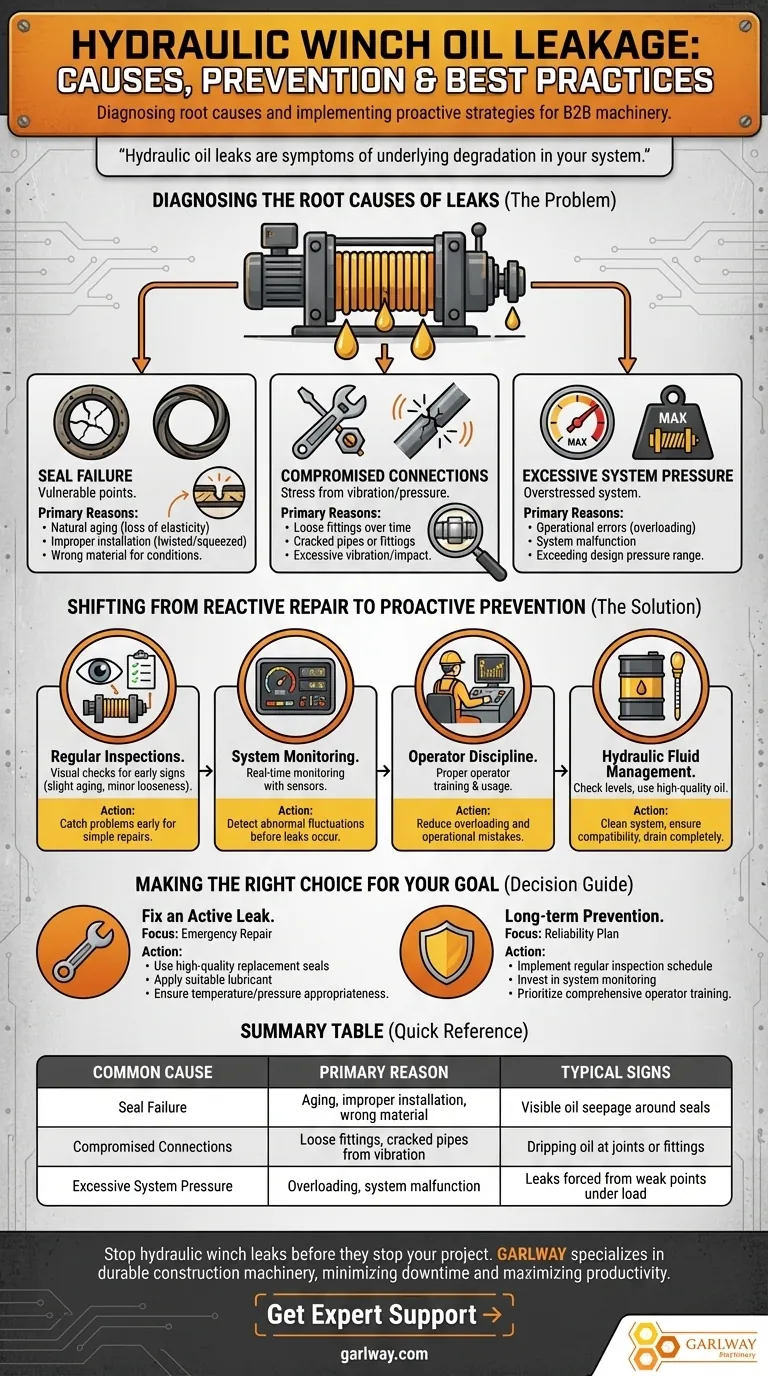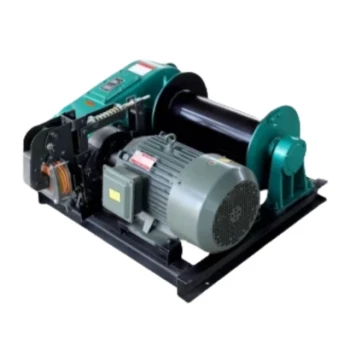The most common causes of hydraulic winch oil leakage are failing seals, compromised hydraulic connections, and excessive system pressure. These issues typically arise from component aging, improper installation, or operational errors, which force hydraulic fluid to escape from the closed system.
Hydraulic oil leaks are rarely sudden events; they are symptoms of underlying degradation in your system. The root cause is almost always a breakdown in materials, connections, or operating discipline.

Diagnosing the Root Causes of Leaks
Understanding why a leak has started is the first step toward a permanent fix. The problem can almost always be traced back to one of three core areas: the seals, the connections, or the system's operating pressure.
Cause 1: Seal Failure
Seals are the most vulnerable points in any hydraulic system. Their failure is a leading cause of leaks.
This can be due to natural aging, where materials like rubber lose their elasticity over time and can no longer maintain a tight closure.
Improper installation is another frequent culprit. A twisted or squeezed seal will fail prematurely, as will using the wrong material for the operating conditions. High-quality seals made of polyurethane or fluororubber are essential for high-temperature, high-wear environments.
Cause 2: Compromised Hydraulic Connections
The connections between hydraulic pipes and components are under constant stress from vibration and pressure.
Over time, fittings can become loose, creating a small but persistent path for oil to escape.
More serious issues include cracked pipes or fittings, often resulting from excessive vibration or physical impact. These structural failures will lead to more significant leaks.
Cause 3: Excessive System Pressure
Every hydraulic system is designed to operate within a specific pressure range. Exceeding this limit overstresses the entire system.
This over-pressurization forces oil through the weakest points, which are typically the seals and connection points.
Excessive pressure often results from operational errors, such as overloading the winch, or a malfunction within the hydraulic system itself.
Shifting from Reactive Repair to Proactive Prevention
Fixing a leak is only half the battle. True reliability comes from a maintenance and operational strategy designed to prevent leaks before they start.
The Importance of Regular Inspections
Proactive maintenance begins with visual checks. Regularly inspect the winch for early signs of oil leakage or component wear.
Catching the slight aging of a seal or a minor looseness in a pipe connection allows for a simple, scheduled repair instead of costly emergency downtime.
The Role of System Monitoring
For critical equipment, real-time monitoring provides a crucial layer of defense.
Using pressure sensors and temperature monitoring devices can help detect abnormal fluctuations that indicate a developing problem long before a leak becomes visible.
Strengthening Operator Discipline
Human error is a significant factor in equipment failure.
Proper operator training ensures the winch is used according to its design specifications, which dramatically reduces leaks caused by overloading or other operational mistakes.
Best Practices for Hydraulic Fluid Management
The fluid itself is a key component. Regularly check the oil level to ensure it is neither too high nor too low.
Always use high-quality hydraulic oil that is compatible with your equipment. When changing the oil, ensure the old, contaminated fluid is drained completely and any residual impurities are cleaned from the system.
Making the Right Choice for Your Goal
Your approach should be dictated by whether you are performing an emergency repair or implementing a long-term reliability plan.
- If your primary focus is fixing an active leak: Ensure you use high-quality replacement seals appropriate for the temperature and pressure, and apply a suitable lubricant during installation to prevent damage.
- If your primary focus is long-term prevention: Implement a schedule of regular inspections, invest in system monitoring where appropriate, and prioritize comprehensive operator training.
Ultimately, preventing hydraulic leaks is a matter of vigilance and adherence to correct procedures.
Summary Table:
| Common Cause | Primary Reason | Typical Signs |
|---|---|---|
| Seal Failure | Aging, improper installation, wrong material | Visible oil seepage around seals |
| Compromised Connections | Loose fittings, cracked pipes from vibration | Dripping oil at joints or fittings |
| Excessive System Pressure | Overloading, system malfunction | Leaks forced from weak points under load |
Stop hydraulic winch leaks before they stop your project. GARLWAY specializes in durable construction machinery, providing reliable winches, concrete mixers, and batching plants built to withstand tough conditions. Our expertise helps construction companies and contractors minimize downtime and maximize productivity. Contact our specialists today for a consultation on maintaining your equipment or selecting the right machinery for your needs.
Visual Guide

Related Products
- Electric and Hydraulic Winch for Heavy Duty Applications
- Hydraulic Concrete Mixer Machine Cement Mixing Equipment for Mixture Concrete
- JDY350 Electric Hydraulic Mortar Mud Concrete Mixer
- Small Electric Winch 120V and 240V for Compact Applications
- Electric 120V Boat Winch by Badlands
People Also Ask
- How are wires classified based on their toughness? A Guide to Wire Grades for Safety & Performance
- What are the main types of trailer winches? Choose the Right Power Source for Your Load
- What are the load capacity advantages of hydraulic winches? Unmatched Power for Heavy-Duty Pulling
- What are the suspension methods for electric hoists? Hook, Lug, or Trolley Mounting Explained
- What are the key advantages of using an air winch? Superior Power and Safety for Hazardous Environments
- How should you calculate the weight to be pulled to avoid exceeding the winch's capacity? Ensure Safe & Effective Recovery
- What are the advantages of ready-mixed mortar compared to on-site mixing? Boost Quality and Efficiency
- What is the purpose of a concrete pump on a construction site? Achieve Faster, Safer, and More Precise Concrete Placement


















